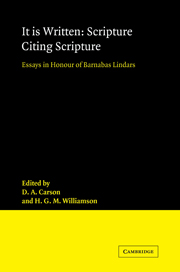1 - An assessment of recent developments
Published online by Cambridge University Press: 16 January 2010
Summary
The distinguished scholar in whose honour this volume has been compiled has placed on record his view that ‘the Old Testament is the greatest single influence in the formation of New Testament theology’ (Lindars, 1976, p. 60). The point is one that needs to be made and to be defended, since it is not certain that it would be universally accepted. The contents of some of the essays which follow in this book will demonstrate the pervasiveness and the variety of the use of the OT in the NT. It should thus constitute both an elucidation and a defence of the position which Professor Lindars has stated and which he has done so much to commend as a scholar whose expertise stretches widely, though never superficially, over both fields.
The scope of this volume has admittedly been defined rather more broadly by its editors as the use of Scripture within Scripture; that is to say, it discusses not only the use of the OT in the various parts of the NT but also the use of earlier parts of the OT in later parts. But since the use of Scripture in the so-called intertestamental literature throws a flood of light on the NT use of the OT, it is inevitable that this topic is also considered. However, the use of Scripture within Scripture in the sense of the use of earlier texts of the NT or of NT traditions within the NT is excluded from consideration.
- Type
- Chapter
- Information
- It Is Written: Scripture Citing ScriptureEssays in Honour of Barnabas Lindars, SSF, pp. 1 - 22Publisher: Cambridge University PressPrint publication year: 1988
- 1
- Cited by



